Christians
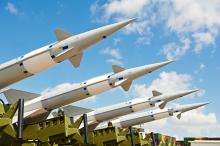
IN APRIL, eight nations, including Iran, announced an agreement for addressing Iran’s controversial nuclear activities. The Iran Nuclear Framework, supported by many Christian leaders in the U.S., is seen as an opportunity to “dramatically restrain the capacity of Iran to acquire nuclear weapons.” It could be one of the most significant nonproliferation achievements in history.
The proposed agreement significantly reduces Iran’s capacity to enrich uranium, closes the plutonium path to weapons capacity, and greatly increases international monitoring and verification of Iran’s nuclear infrastructure. It allows for lifting sanctions against Iran and opens the door to the possibility of improved bilateral relations.
The multiyear agreement sharply curtails Iran’s enrichment program. Iran has agreed to reduce by approximately two-thirds its installed centrifuges, from about 19,000 today to 6,104 under the deal. And Iran has agreed not to build any new facilities for the purpose of enriching uranium for 15 years.
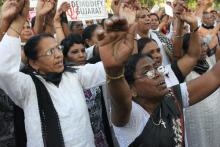
Each day, children on their way to Mount Carmel School pass through gates under the watch of armed security guards, and now city police officers who stop there on government orders after a nearby Catholic convent and school were broken into.
The vandals stole money, tampered with security cameras, and ransacked the principal’s office on Feb. 13.
The crime itself was relatively minor, but it rippled through other Christian schools. The attack was the sixth this year in an ongoing series targeting Christian communities and schools across India.
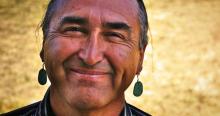
AT THE WORLD Christian Gathering of Indigenous People in 1996, our North American Native delegation was unable to find any “Christian” Native powwow music that we could use to dance to as part of our entrance into the auditorium. This was important at the time, as we didn’t feel the liberty to use “non-Christian” powwow music for a distinctly Christian event. A contemporary Christian song by a Caucasian worship leader using some Native words and a good beat was selected.
Except in a handful of cases (believers among the Kiowa, Seminole, Comanche, Dakota, Creek, and Crow tribes, to name some)—and those always in a local tribal context—Native believers were not allowed or encouraged to write new praise or worship music in their own languages utilizing their own tribal instruments, style, and arrangements.
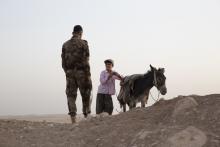
Basima al-Safar retouches a picture of Jesus on an easel outside her house overlooking the flat Nineveh plains, 30 miles north of Mosul.
The murals she paints tell the story of her people, Christians in Iraq. But with Islamic State militants nearby, she is worried that life in Alqosh and towns like it could soon come to an end.
The Assyrian Christian town of around 6,000 people sits on a hill below the seventh-century Rabban Hormizd Monastery, temporarily closed because of the security situation. Residents of Alqosh fled this summer ahead of Islamic State militants. Around 70 percent of the town’s residents have since returned. Still, a sense of unease hangs in the air.
Below the monastery in the boarded up bazaar a lone shopkeeper waits for customers. At the edge of town local Christian fighters staff lookout posts, checking for danger. With Islamic State fighters just 10 miles away, these men and most residents of the town are scared that they may have to flee again.

A new institute in Jerusalem has been awarded $2.2 million to help Christians and Jews study Jewish texts, launching what’s being billed as a new kind of Jewish-Christian cooperation.
The Herzl Institute was awarded what’s being called the first ever multimillion-dollar grant in Jewish theology by the U.S-based Templeton Foundation, a philanthropic organization that has focused much of its giving on science-related projects. The Herzl Institute is a research institute that focuses on the development of Jewish ideas in fields like philosophy and history.
The institute is named for Theodor Herzl, considered the father of modern political Zionism, ideas that have found much support from conservative and evangelical Christians in the U.S.
Jewish and Christian collaboration has often been relegated to the political level, said Herzl President Yoram Hazony. The partnership reflects a new kind of engagement between Christians and Jews, he said.

We met over email in the spring of 2012. I had just co-launched a literary blog and our mutual friend introduced us as fellow writers. Stephanie and I immediately hit it off. Not only was she a gifted writer, Stephanie and I shared a similar sense of humor and sensibility. As we got to know each other and began to write with each other, we discovered a ridiculous number of similarities and common points of interest, including and especially, our shared Christian faith. To paraphrase C.S. Lewis, it was as though every other email was a “you too?” moment.
Then one day I wrote a piece that indicated my progressive political leaning. The 2012 presidential election was heating up and though the piece was not overtly political, it revealed my beliefs. Stephanie, it turned out, was a conservative.
This news wasn’t really a big deal to me — I am used to have friends and family who have different political beliefs, and I even got my first start in the blogging world as the token “progressive” Christian through a conservative friend’s blog. But things were getting heated with the election and we didn’t know each other that well.
Stephanie and I began to email back and forth about politics through the lens of faith, which tested whether we were Christians or ideologues first. We shared two things in common in holding our different political beliefs because: 1) we had both thought a lot about them, and, 2) shockingly, neither of us had an interest in destroying America. Eventually Stephanie and I decided to co-write a bipartisan series for our website, looking at partisanship through the lens of faith (summary: love for Jesus makes for fertile common ground).
After the election it was hard to ignore the mix of apocalyptic expressions of woe and the tone-deaf exclamations of victory. Each came with its own vilification of the other party. I found myself at parties with fellow progressives defending conservatives because the caricatures of them were plainly wrong, and I would be hurt if Stephanie didn’t defend me against caricatures of progressives.
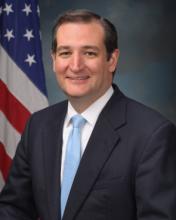
After he said “Christians have no greater ally than Israel,” Sen. Ted Cruz, R-Texas, was heckled off the stage at a Sept. 10 gala to raise awareness of beleaguered Mideast Christians.
Cruz, the keynote speaker at the Washington, D.C., dinner, sponsored by In Defense of Christians, a new organization spearheaded by Catholic and Orthodox Christians, prompted boos and cries of “stop it!” and “enough” and “no!” as an increasingly louder crowd told him to get off the stage.
The incident, first reported by the online news organization The Daily Caller, was captured on video by EWTN, the Catholic television network. The video shows that Cruz tried to continue speaking, but many in the audience, in a hotel ballroom, expressed anger when he included Hamas in the list of militants out to destroy religious minorities in the Middle East.
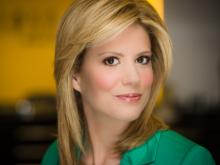
Iraq’s Christians are begging the world for help. Is anybody listening?
Since capturing the country’s second largest city of Mosul in early June, the Islamic State, formerly known as ISIS, has ordered Christians to convert to Islam, pay taxes levied on non-Muslims, or die. The extremist Sunni group is also persecuting and murdering Turkmen and Shabaks, both Muslim religious minorities.
Human rights lawyer Nina Shea described the horror in Mosul to me: “[The Islamic State] took the Christians’ houses, took the cars they were driving to leave. They took all their money. One old woman had her life savings of $40,000, and she said, ‘Can I please have 100 dollars?’, and they said no. They took wedding rings off fingers, chopping off fingers if they couldn’t get the ring off.”
“We now have 5,000 destitute, homeless people with no future,” Shea said. “This is a crime against humanity.”
For the first time in 2,000 years, Mosul is devoid of Christians. “This is ancient Nineveh we are talking about,” Shea explained. “They took down all the crosses. They blew up the tomb of the prophet Jonah. An orthodox Cathedral has been turned into a mosque. … They are uprooting every vestige of Christianity.” University of Mosul professor Mahmoud Al ‘Asali, a Muslim, bravely spoke out against the Islamic State’s purging of Christians and was executed.

THE VIOLENCE AND kidnappings in Nigeria are more than a religious conflict: They are a political manipulation of religion.
Before the 2011 Nigerian election, northern politicians (who are mostly Muslims) threatened to make the country ungovernable if Goodluck Jonathan, a Christian from the south, became president. Jonathan was vice-president for Umaru Musa Yar’Adua, a Muslim from the north, who died before completing his eight-year term. Jonathan assumed power after Yar’Adua’s death, as is allowed by the constitution. However, northern Muslims claimed that since Yar’Adua did not finish his term, they should be allowed to place someone of their own choosing in power. Jonathan’s refusal angered the north.
In response, the Muslim terrorist organization Boko Haram began intensifying its attack on Jonathan’s rule in order to discredit his presidency and his pursuit of the 2015 election. If Boko Haram succeeds in pushing Jonathan out, southern militia groups are likely to commence their own violent campaign. These terrorists are trying to manipulate people by making them think that it is a religious fight, when in reality it is about political power.
People, however, are beginning to reject the violence. In April, as the world is well aware, Boko Haram kidnapped more than 200 schoolgirls from Chibok, a community that is said to be about 90 percent Christian. The outcry of rage and pain about this incident transcended religious lines. In a May market bombing in the city of Jos, both Christians and Muslims lost their lives. After the bombings, Muslims and Christians on the streets of Jos tried to work together in finding a way through the situation. People no longer want to fight and are starting to value peacebuilding and interfaith efforts. This is a sign of hope.

We’re headed home from Wild Goose Festival, a gathering of artists, activists, musicians, and theologians, in Hot Springs, N.C. It was hot, rainy, and messy. My suitcase smells like my fifth grade gym locker.
I can’t wait to go back next year.
The speakers are remarkable; many of them are walking the talk they’re offering, which is an unfortunately rare phenomenon. The music is fresh and exciting, the art is created before your eyes, and there is an energy of hopeful expectation that renews your soul, flushing out the broken-down-ness of daily life.
But the most important part of the whole four-day event lies in the unexpected moments. Sometimes I would walk along the main dirt road in the middle of the grounds, lined with tables, tents, and makeshift gathering spaces, until I saw something interesting going on and just joined in.
In one moment you’re debating the theological implications of the American food-industrial complex. Half an hour later, you’re laughing with new friends in the beer tent. And then, just when the sun sets and you’re sure you lack the fortitude to go one any more, the music on the main stage cranks up and the very earth beneath you vibrates.


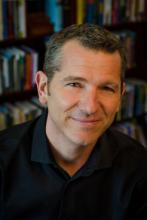
Despite progress in defeating extreme global poverty, most Americans see no end in sight, according to a survey sponsored by Compassion International.
Christians who attend church at least monthly and consider religion very important in their life overwhelmingly (96 percent) expressed concern about the world’s poorest people. But they were skeptical that global poverty could be ended in the next 25 years. Only 41 percent of the group said it was possible.
And yet Scott Todd of Compassion International, the Christian nonprofit agency that sponsors 1.5 million children abroad, remains upbeat. He sees hope in the numbers of “practicing Christians” who express concern about poverty and a willingness to do more.
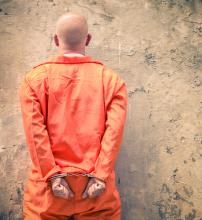
I WORK ON the frontlines of the movement to end the death penalty in the United States. I grew up in a conservative evangelical home and my faith has led me to this work. In 2008, I had the opportunity to hear stories from murder victims’ family members, death row exonorees, and corrections officials who participated in executions—all of whom believe the death penalty should be abolished. At that point I felt called to do this work and to begin engaging with other evangelicals.
I will confess, it was a lonely job when I started. I wondered who else would join me. So you can imagine my excitement at seeing what has today become a nationwide chorus of Christian voices questioning capital punishment.
A recent poll by the Barna Group showed a majority of Christians in the United States now oppose capital punishment and that young Christians oppose it by a large majority. More than two dozen evangelical leaders from around the country and across the political spectrum recently made their voices heard by publicly requesting a new sentencing hearing, free of racial bias, for a Texas death row inmate. Even conservative political leaders are speaking out against the death penalty.
As one who has been in the trenches on this issue for years, I can confirm that Christian engagement is helping to transform the death penalty debate, and I can tell you that it is being driven by the same forces that moved me—faith and cold, hard facts.
OUR HISTORY IS increasingly hostage to a deep and broad ecological crisis. Stalking us for centuries, it is now upon us in the interlocking catastrophes of climate destruction, habitat degradation, species extinction, and resource exhaustion. Some call it “peak everything.”
“All we have to do to destroy the planet’s climate and biota and leave a ruined world to our children and grandchildren,” concluded environmental policy analyst James Gustave Speth in The Bridge at the Edge of the World, “is to keep doing exactly what we are doing today ... to release greenhouse gases ... impoverish ecosystems and release toxic chemicals at current rates, and the world in the latter part of this century won’t be fit to live in.”
Our Christian faith and practice now unfold either in light of or in spite of this crisis. Our choice is between discipleship and denial.
Two trends among thoughtful Catholics, evangelicals, and other Protestants in North America over the last quarter century are helping awaken us to “response-ability” in the face of these inconvenient truths. One is the spread of contextual theology, which demands both analysis and engagement with social realities around us. The other is how “creation care” has gained broad traction among churches.
But these trends need to be integrated. Contextual approaches have tended to address social, economic, and political issues apart from ecological ones. And environmental theologies are not contextual enough: often too abstract (debating “new cosmologies”), focused on remote symptoms (tropical rain forests or polar ice caps), or merely cosmetic (“greening” congregations through light bulb changes while avoiding controversies such as the Keystone XL pipeline).
Our “all hands on deck” moment requires a practical approach that challenges and equips our churches to learn how to “serve and preserve” the earth (Genesis 2:15). The best way to do that is to focus on the particular places in which we dwell.
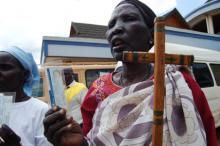
For Christians living in predominantly Muslim Sudan, travel restrictions are making life more difficult each day, a Roman Catholic cardinal said.
Sudanese Cardinal Gabriel Zubeir Wako highlighted the challenges at a Catholic Bishops Conference in Juba, the Republic of South Sudan’s capital. His auxiliary bishop could not attend the Jan. 21-30 meeting because his passport was seized by security agents, along with those of eight priests.
“Christians in the two countries are facing difficulties,” Wako told the gathering. “We [bishops] must focus on serious matters and come up with strong messages.”
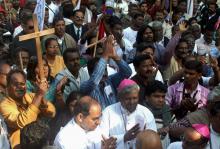
NEW DELHI — Police in India’s capital used water cannons and canes on peaceful Christian and Muslim leaders Wednesday while they were demanding equal constitutional protections.
Organized jointly by confederations of churches and Muslim groups in India, the demonstrators demanded affirmative action for Dalits (formerly “untouchables”) who have converted to Christianity or Islam.
Only Dalits who have converted to Hinduism, Sikhism, or Buddhism are entitled to affirmative action slots in jobs and educational institutions, among other protections.
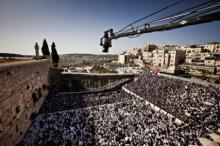
It may be as close as a person can get to praying at the Church of the Holy Sepulchre, the Al-Aqsa Mosque and the Western Wall, without actually going there.
The newly released movie “Jerusalem,” filmed in 2D and 3D and playing on IMAX and other giant-screen theaters across the U.S. and the world, gives viewers grand, hallmark panoramas, at once awe-inspiring and intimate.
For years filmmakers had sought the rights to capture the city from the air, but never before had permission been granted, in part because the holy city is a no-fly zone.
Still, before filming began in 2010, producer Taran Davies came up with an extensive wish list of all the sites and rituals he wanted in the film, and presented it to advisers familiar with the spectrum of religious and secular officials who would have to approve.
“They all laughed and said forget about it,” Davies said. “They said, ‘It’s impossible and you’re not going to get half of what you’re looking for.’”
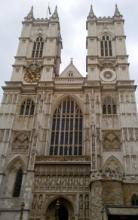
At an emotional worship service, considered one of the largest gatherings of Christians and Jews, some 1,600 British men and women filed into Westminster Abbey Sunday to mark the 75th anniversary of Kristallnacht.
Also known as the Night of Broken Glass, Kristallnacht was a series of coordinated attacks carried out by Nazi paramilitaries and civilians against Jews throughout Hitler’s Germany and parts of Austria between Nov. 9 and 10, 1938.
More than 90 German Jews were killed and 30,000 more sent to concentration camps.
During the hourlong service, a candelabra from the Belsize Square Synagogue in central London was processed through the abbey where England’s kings and queens are buried.
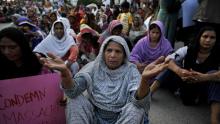
MY HEART WAS broken when I got the news on a Sunday in September: All Saints Church in Peshawar, Pakistan, had been attacked by two suicide bombers just after the Sunday service, as worshippers filtered out of the sanctuary. Eighty-five people were killed, including 34 women, seven children, and two Muslim police officers there to provide security. Later reports said the bombers were Sunni extremists.
In 1976, I was honored to start Youth for Christ in Peshawar. There were few Christians in this area near the Afghan border; Peshawar was not and is not a big town. Undoubtedly, some of the adults in and around the church when it was bombed were people I had met decades earlier.
News of the bombing confounded my memory of Peshawar 38 years ago. Religious plurality then was not perfect, but it was in great contrast to today. Christians, though few, served the Lord with some freedom. Youth for Christ held open-air rallies in the park, amplified by public-address speakers, with young people singing Christian songs with Bible messages to be heard by anyone within earshot. No security was needed, and truth be told both Muslim and Christian youth were in the audience and the choir.
The start of the second Gulf war in 2003, and subsequent military actions, changed everything. Reports say the church bombing in Peshawar was in retaliation for U.S. drone strikes that killed innocent men, women, and children, along with suspected terrorists, in that part of Pakistan. Peshawar is strategically located on the border with Afghanistan, not far from the famous Khyber Pass and only about 125 miles from where Osama bin Laden was killed.